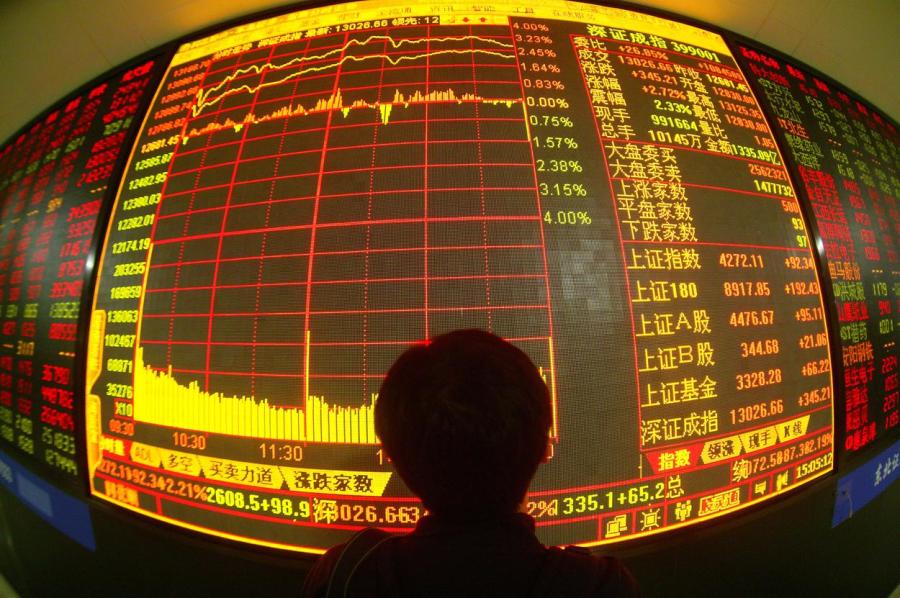Ordinary people watching China’s stock market data. (Photo by China Photos/Getty Images)
[People News] On September 3, Beijing held a grand military parade, showcasing dazzling cutting-edge weapons. But the stock market didn’t follow the script—China’s A-shares, particularly the defense and military sector, led the decline. The following day, the stock market suffered its steepest drop in nearly five months. Taiwanese financial commentator Hu Caiping analyzed that the ups and downs of China’s stock market often seem tied to Xi Jinping’s health.
According to China News Weekly, this year’s parade was the first to publicly unveil advanced technologies such as hypersonic precision strikes, unmanned combat, and counter-drone systems, underscoring China’s growing defense capabilities and deterrence power.
Yet despite releasing such seemingly positive news for the defense sector, the A-share market slumped on September 3, with defense stocks taking the hardest hit.
During the morning session, markets fluctuated, with the Shanghai Composite Index leading the decline. By midday, total turnover in Shanghai and Shenzhen reached 1.45 trillion yuan, down 456.7 billion yuan from the previous trading day. The majority of stocks fell—over 4,300 across the market.
By the September 3 close:
-
Shanghai Composite Index dropped 0.96%
-
Shenzhen Component Index fell 0.63%
-
ChiNext Index closed flat
According to Securities Times, “military-civil fusion” concept stocks plunged 4.67%, among the worst-performing categories. Companies such as Beifang Changlong hit the 20% down limit, while Aerospace Technology, Lijun Shares, and Zhongtian Rocket also fell to limit down.
Market observers quickly noted the anomaly. On September 3, financial blogger “Gu Yisheng” wrote on X that the aerospace-defense sector had been heavily overhyped for years, creating a severe bubble. He predicted the parade would give big institutions the perfect chance to offload shares.
Indeed, the following day (September 4), China’s stock market suffered its sharpest intraday drop in nearly five months. All three major indexes fell, with the ChiNext Index leading the slide:
-
Shanghai Composite down 1.25% to 3,765.88
-
Shenzhen Component down 2.83% to 12,118.7
-
ChiNext down 4.25% to 2,776.25
Consumer-related sectors such as retail, cosmetics, food & beverage, and tourism rose, while AI hardware, rare earth, and defense stocks sank.
Turnover in Shanghai and Shenzhen reached about 2.54 trillion yuan, up 180.1 billion yuan from the previous session. Of the market’s stocks, 2,297 rose, 2,990 fell, 43 hit the upper limit, and 47 hit the lower limit.
One of the most eye-catching moves was chipmaker Cambricon. Its stock plunged as much as 15.85% intraday, closing down 14.45% at 1,202 yuan per share, wiping out nearly 84 billion yuan in market value in a single day.
Since overtaking Kweichow Moutai as China’s most expensive stock on August 28, Cambricon had already corrected over 20% from its peak of 1,595.88 yuan. National Business Daily reported that the slump was tied to the Shanghai Stock Exchange’s decision to rebalance the STAR 50 Index, cutting Cambricon’s weighting from about 15% to 10%.
Financial Times quoted investors saying this was a good time to cash out tech stock gains, while Bloomberg reported that regulators may be trying to cool down the market—another reason behind the sell-off.
Commentator Hu Caiping offered a more political lens:
-
She noted that China’s stock market has long been a “policy-driven market.” In the past, the worse the economy, the more investors bought stocks, expecting government stimulus.
-
But since Xi Jinping came to power, she said, it’s been like a “water-guzzling beast”—money goes in but never comes out, and instead of stimulus, Xi keeps tightening.
She added that rumors of Xi’s failing health or loss of political power had revived investor optimism, fueling hopes of a policy turnaround. “This year, as many of Xi’s loyalists in the Party, government, and military have fallen, people speculate Xi is in poor health and might not last long, or that his faction has lost the power struggle. Investors believe that with Xi’s fall, the economy might rebound.”
On September 3, Hu observed that Xi’s appearance at the parade was closely watched:
-
At first, his face looked dark and weak as he delivered a speech.
-
But then he managed to stand in a military vehicle for nearly half an hour, waving and greeting troops with “Comrades, you’ve worked hard!”
This led some to conclude he didn’t look close to death after all.
Hu noted that the Shanghai and Hong Kong markets opened strong that morning, but as Xi stood firm through the parade, the indices gradually slumped. She described the charts trending “from top left to bottom right,” reflecting the market’s mixed emotions toward Xi’s continued grip on power.









News magazine bootstrap themes!
I like this themes, fast loading and look profesional
Thank you Carlos!
You're welcome!
Please support me with give positive rating!
Yes Sure!